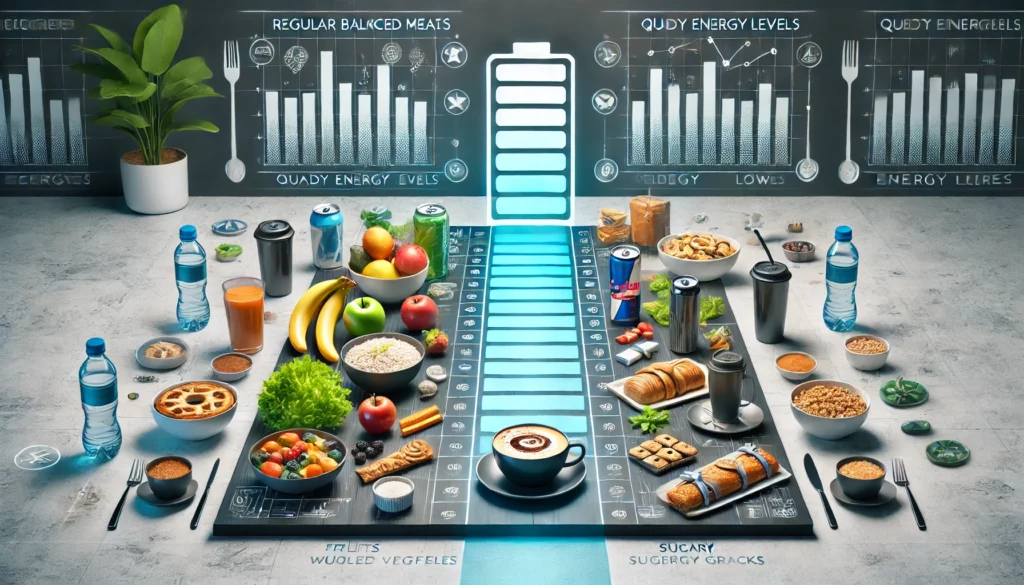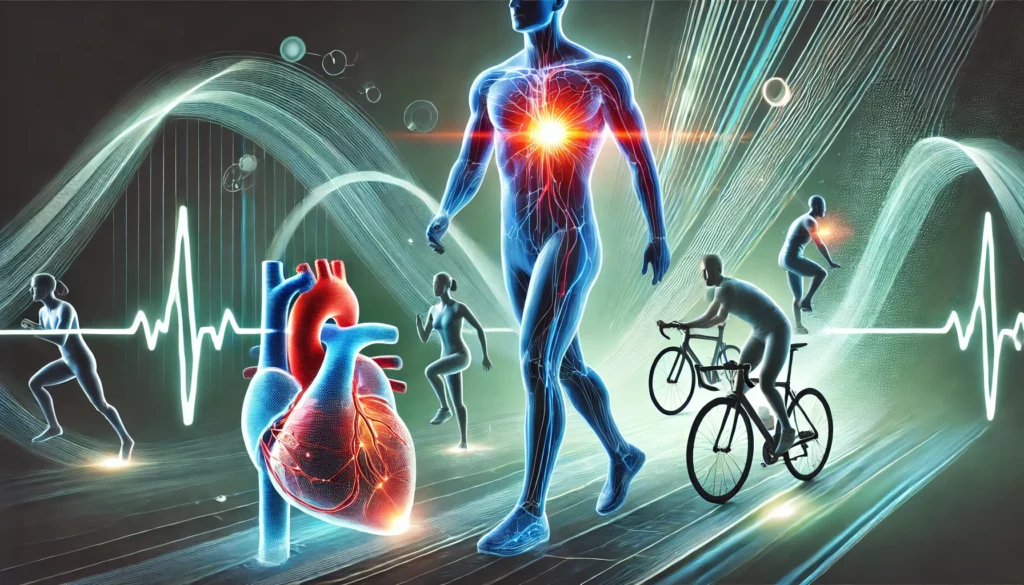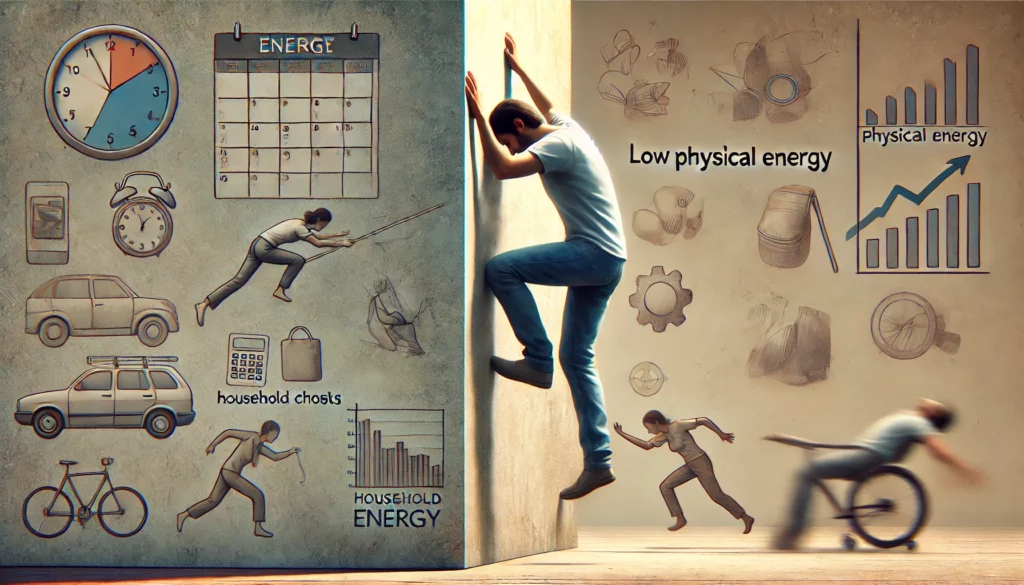*This post may contain affiliate links for which I earn commissions.*
Low physical energy can feel like being stuck in a car with an empty fuel tank. It means your body isn’t producing enough energy to keep you going throughout the day. You might feel persistent tiredness, have trouble concentrating, or just lack the motivation to do things you usually enjoy. The symptoms of low physical energy can vary. Common signs include a constant sense of fatigue, difficulty doing daily tasks, mood swings, and even physical symptoms like headaches or muscle weakness. It’s like your body has hit a wall that it can’t seem to climb over, no matter how much rest you get.
Low Physical Energy is more Common Than you Think
Low physical energy isn’t something that only affects a few people. It’s pretty common and can affect anyone regardless of age, gender, or background. However, it tends to show up more in adults juggling multiple responsibilities or facing chronic stress, making it especially important to recognize and address.
Understanding that low physical energy can stem from various sources is crucial. It might be due to underlying health issues, lifestyle choices, or even mental health conditions. Awareness is the first step in finding the right approach to manage and overcome it. It’s not just about pushing through the tiredness; it’s about identifying and addressing the root causes.
Medical conditions
Anemia, for instance, means your body doesn’t have enough healthy red blood cells to carry adequate oxygen to your tissues, causing fatigue and weakness. Issues with your thyroid can also mess with your energy levels because hormones produced here regulate your metabolism.
Lifestyle Choices
A poor diet lacking essential nutrients like iron, vitamins, and proteins can sap your energy. Skipping exercise or being too sedentary can make your body more tired in the long run. And of course, not getting enough sleep isn’t just about the quantity of hours; the quality of your sleep matters too.
Mental health
Conditions like depression and anxiety are known to drain your energy. They can make even simple tasks feel monumental, which is exhausting. Stress and burnout are also culprits. When you’re constantly on edge, your body uses up more energy just trying to cope.
Chronic Stress
When you are under constant stress, your body remains in a heightened state of alertness, which can drain your energy reserves over time. Chronic stress triggers the release of stress hormones like cortisol, which can disrupt your sleep patterns, impact your immune system, and lead to mental and physical exhaustion.
Recognizing these causes is empowering. Once you know what’s draining your energy, you can take steps to make changes. Sometimes, it’s about tweaking your diet or exercise routine. Managing stress through techniques such as mindfulness, exercise, and relaxation can help restore your energy levels and improve overall health. Other times, it’s about seeking professional help to address underlying health conditions or mental health issues. The key is to pay attention to your body and mind, and listen to what they need.
Diagnosing Low Physical Energy
Figuring out why you’re consistently low on energy involves more than just a quick Google search. Sometimes it’s obvious, but other times it requires a bit of detective work. The first step is knowing when to consult a healthcare professional. If fatigue is interfering with your daily life or lasting more than a couple of weeks, it’s time to get expert advice.
A healthcare provider will usually start with a detailed history and physical examination. They may ask about your diet, exercise habits, sleep patterns, and emotional well-being. This comprehensive approach helps to rule out various potential causes. Blood tests are commonly ordered and can check for anemia, thyroid function, vitamin deficiencies, and other underlying conditions.
Self-assessment tools can also be a good starting point. Keeping a fatigue diary where you track your energy levels at different times of the day, noting what you eat, your activities, and your sleep quality can offer valuable insights. Apps and online questionnaires can also provide a preliminary overview but should not replace professional diagnosis.
Understanding your body’s signals is essential. For some, a simple change in diet or adding a bit more exercise might do the trick. For others, medical treatment or lifestyle changes might be necessary. Always ensure that your approach is informed and guided by professional advice. Sometimes, the solution is straightforward, but it often requires a holistic approach that considers both your body and mind.
Here is an article about whether or not physical Activity is appropriate for seniors Another is here Top Vitamins For Boosting Mood And Energy
My goal? To test out every diet and exercise regimen on planet earth and figure out which work best. I sweated, I cooked, I learned to pole dance. In the end, I lost weight, lowered my cholesterol and doubled my energy level. I feel better than I ever have.
a.J.Jacobs
Diet and Nutrition for Boosting Energy
What you eat plays a huge role in how you feel during the day. Filling your plate with the right nutrients can give your body the fuel it needs to function properly. Foods rich in complex carbohydrates, like whole grains, release energy slowly, keeping you feeling full and energized longer. Proteins from sources such as lean meats, beans, and nuts are essential for muscle repair and energy production.
Vitamins and minerals are equally important. B vitamins, especially B12, help convert food into energy. Iron supports your blood in carrying oxygen. A deficiency in these can leave you feeling drained. Including plenty of fruits and vegetables ensures you’re getting a broad range of nutrients that support overall health and energy levels.
But it’s not just about what you eat; how you eat matters too. Regular, balanced meals help maintain steady energy levels. Skipping meals or going too long without eating can lead to drops in blood sugar, causing fatigue. Listening to your body’s hunger cues and eating when you’re genuinely hungry helps maintain a balanced energy level throughout the day.
Some foods and drinks might feel like they give you a quick energy boost, but they can actually make things worse in the long run. Caffeine and sugar are prime examples. While they can provide a short-term burst of energy, they often lead to crashes that make you feel even more fatigued. Cutting back on these can help you avoid those peaks and valleys in your energy levels.

Hydration is another critical piece of the puzzle. Dehydration can leave you feeling sluggish and tired. Drinking enough water throughout the day supports all of your body’s functions, including energy production. If plain water isn’t your thing, try herbal teas or water infused with slices of fruit for a little extra flavor.
Making these dietary adjustments won’t work overnight, but consistent, balanced nutrition will help combat fatigue and boost your energy levels over time. Paying attention to what and how you eat is a proactive way to support your overall energy and well-being.
The Role of Exercise in Energy Levels
Getting into a good exercise routine can significantly boost your energy levels. It might seem counterintuitive, especially when you’re already feeling tired, but physical activity stimulates your body to produce more energy in the long run.
Regular exercise improves cardiovascular health, enabling your heart and lungs to work more efficiently. This means better oxygen and nutrient delivery to your tissues, which translates to more energy for daily activities. Aerobic exercises like walking, swimming, or cycling are excellent choices to start with. They’re effective at boosting your stamina without being too taxing.
Strength training is also beneficial. Building muscle mass not only strengthens your body but also increases your resting metabolic rate. This means you’re burning more calories and producing more energy even when you’re not exercising. Activities like weight lifting, resistance band exercises, or bodyweight workouts can be particularly effective.
If you’re new to exercise or haven’t been active for a while, start small. Even short walks or light stretching can make a difference. The key is consistency. Over time, you can gradually increase the intensity and duration of your workouts.
Incorporating exercise into a busy schedule can be challenging but it’s doable. Consider breaking your exercise into smaller chunks throughout the day. A 10-minute walk in the morning, a quick workout during lunch, and some stretching in the evening can add up. Finding activities you enjoy makes it easier to stick with it.
Exercise also has a positive impact on mental health, which in turn affects physical energy. Physical activity releases endorphins—those feel-good chemicals that help reduce stress and improve mood. Managing stress more effectively can prevent the energy drain that comes with worry and overthinking.
The benefits of regular physical activity go beyond just boosting your energy. It contributes to your overall well-being, helping you feel more vibrant, alert, and ready to tackle the challenges of daily life.

Mental Well-being and Energy Management
Your mental state has a profound impact on your physical energy levels. When your mind is reeling from stress and anxiety, your body often follows suit, acting sluggish and worn-out. Maintaining mental well-being is essential for boosting physical energy.
Stress is a major energy zapper. It triggers your body’s ‘fight or flight’ response, which takes a lot of energy. Learning to manage stress through relaxation techniques like deep breathing, meditation, or yoga can make a big difference. Even simple activities like reading a book or taking a short walk can reduce stress levels.
Anxiety and depression also play a significant role. They can make everyday tasks seem insurmountable, adding to fatigue. Seeking professional help from a therapist or counselor can provide coping strategies and treatment options to better manage these conditions.
Mindfulness practices can also help balance energy levels. Being present in the moment reduces worrying about the past or future, which can be exhausting. Techniques like focused breathing, body scans, and even mindful eating can center your mind and body.
Social connections contribute to mental well-being too. Spending time with friends or loved ones helps recharge your mental batteries. Talking through problems or simply enjoying companionship can reduce feelings of isolation and stress.
Mental well-being also thrives on routine. Establishing a daily schedule can prevent mental burnout. Regular sleep, meals, and planned relaxation time create a balanced rhythm that helps maintain consistent energy levels. Routines can give a sense of normalcy and control, which is soothing for the mind.
Combining these mental well-being strategies with other lifestyle changes provides a comprehensive approach to managing low energy. Your mind and body are closely connected, and nurturing both is key to feeling more energetic and alive.
Sleep and Rest: Cornerstones of Energy
Quality sleep is fundamental to maintaining good energy levels. It’s during sleep that your body repairs itself and processes memories, so skimping on sleep can leave you feeling drained and foggy the next day. Aiming for 7-9 hours of quality sleep each night is crucial.
Improving sleep hygiene can make a significant difference in how you feel. This involves creating a restful environment—think a cool, dark, and quiet room. Keeping a consistent sleep schedule by going to bed and waking up at the same time every day, even on weekends, helps regulate your internal clock.
Pay attention to your evening routine. Avoid caffeine and heavy meals close to bedtime. Instead, opt for calming activities like reading or taking a warm bath to signal to your body that it’s time to wind down. Reducing screen time before bed can also help, as the blue light from devices can interfere with your ability to fall asleep.
Understanding sleep disorders is important too. Conditions like insomnia, sleep apnea, and restless leg syndrome can severely impact your quality of sleep and, consequently, your energy levels. If you suspect you have a sleep disorder, it’s important to seek medical advice. Treatments are available that can significantly improve your sleep quality and overall energy.
Naps can be a double-edged sword. While a short, 20-30 minute nap can boost your energy levels, sleeping too long during the day can interfere with your nighttime sleep. It’s about finding what works for you. Sometimes, a quick rest is all you need to recharge.
Good sleep and rest are essential for your body’s recovery and energy production. If your sleep is off, so will be your energy levels. Paying attention to your sleep habits and making necessary adjustments can help keep you feeling refreshed and ready to face each day.
Energy-Boosting Lifestyle Changes

Time management plays a crucial role in maintaining energy levels. Prioritizing tasks and breaking them down into manageable chunks can prevent feelings of being overwhelmed, which often lead to fatigue. Using tools like planners, to-do lists, or digital apps can help organize your day and ensure you stay on track without overexerting yourself.
Creating a supportive environment is also important. Your surroundings can influence your energy levels more than you might realize. Keeping your home and workspace tidy can reduce stress and create a more positive atmosphere. Sometimes, even small changes, like adding plants or letting in more natural light, can make a significant difference.
Regular breaks are essential, especially during long hours of work or study. Short, frequent breaks can prevent burnout and keep your mind and body fresh. Consider techniques like the Pomodoro Technique, where you work for 25 minutes and then take a 5-minute break, to maintain productivity and energy throughout the day.
Incorporating leisure activities into your routine is another effective way to boost energy. Engaging in hobbies you love or trying new activities can keep your mind stimulated and your energy levels high. Whether it’s reading, painting, gardening, or playing a sport, make time for activities that bring you joy and relaxation.
Social interactions can also play a big role in how energetic you feel. Positive relationships and socializing with friends or colleagues can provide emotional support and reduce stress, which in turn can improve your energy levels. Even a quick chat can lift your spirits and give you a boost.
Staying hydrated is often overlooked but is crucial for energy levels. Dehydration can cause fatigue and reduce physical performance. Ensure you’re drinking enough water throughout the day. Carry a water bottle with you as a reminder to stay hydrated.
Lastly, mindfulness and relaxation techniques should be part of your energy-boosting lifestyle changes. Practices such as yoga, meditation, and even simple breathing exercises can help manage stress and improve overall well-being. These techniques can help you stay centered and maintain your energy levels despite the daily challenges you face.
When to Seek Professional Help
Sometimes, no amount of self-care or lifestyle adjustments can solve your low energy issues. Recognizing when it’s time to seek professional help is crucial. Persistent fatigue that doesn’t improve with rest, diet, and exercise might indicate an underlying health condition that needs medical attention.
Consulting with a healthcare provider is your first step. They can conduct a thorough evaluation, including asking about your symptoms, lifestyle, and medical history. Blood tests or other diagnostic procedures might be necessary to identify issues like anemia, thyroid problems, or other metabolic disorders.

Mental health professionals can also provide valuable support. If anxiety, depression, or chronic stress is draining your energy, therapy or counseling could be beneficial. They can offer strategies to manage mental health conditions, which in turn can improve your physical energy levels.
Getting a second opinion can sometimes be helpful if you feel your concerns are not adequately addressed. Don’t hesitate to consult another healthcare provider if your current approach isn’t working.
Before your visit, keep a detailed record of your symptoms, including when they occur and any potential triggers or patterns. This information can help your healthcare provider make an accurate diagnosis. Be open about all aspects of your health – physical, mental, and emotional.
Preparing for your healthcare visit involves more than just listing symptoms. Have a list of questions ready, and don’t be afraid to ask about potential causes and treatment options. Understanding your condition and the available treatments can empower you to make informed decisions.
Taking that step to seek professional help can be daunting, but it’s a crucial part of managing your health. Professional guidance can provide clarity, offer effective treatment options, and, ultimately, help you regain your energy and well-being.
Conclusion Embracing Strategies to Overcome Low Physical Energy
Low physical energy is a multifaceted issue that can significantly impact your quality of life. By understanding and addressing the underlying causes, such as medical conditions, mental health challenges, lifestyle choices, nutritional deficiencies, poor sleep quality, and chronic stress, you can begin to reclaim your vitality. Adopting a holistic approach is crucial. Prioritize balanced, regular meals that stabilize blood sugar levels and sustain energy throughout the day. Incorporate regular aerobic exercise into your routine to boost cardiovascular health and stamina. Pay attention to your body’s signals, ensuring you get quality sleep and manage stress effectively.






